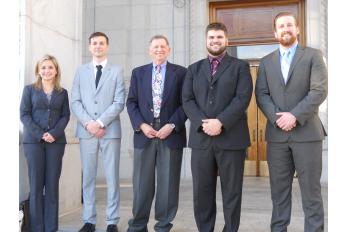Moot Court Members at California Supreme Court Hear Professor Spiegelman Argue Capital Case
November 11, 2011
Four members of the Moot Court Honor Society traveled to San Francisco to hear their faculty advisor Professor Paul J. Spiegelman argue a death penalty appeal before the California Supreme Court (People v. Sonny Enraca). Students who attended the appeal included Jesse Allen, Rane Casalegno, Samantha Ciriaco, and Zachary Ruetz. The trip was part of Moot Court’s program to help our students hone their oral advocacy skills for upcoming competitions by seeing what real-life oral arguments are like.
All four students who attended will be representing TJSL in competitions in the near future. Jesse is a member of TJSL’s Jessup International Law Moot Court team which will compete in February 2012. Zachary competed in the regional rounds of the National Moot Court Competition hosted by TJSL the weekend of November 12-13. Rane and Samantha will be traveling to Chicago to represent TJSL in the Chicago Bar Association’s Moot Court Competition.
All four found this to be a uniquely valuable learning experience. Not only did they get to see Professor Spiegelman argue before the court, but they saw his opposing counsel and amicus counsel for the Philippine Government as well as hear an argument in another case. Perhaps the biggest lesson they learned was to be themselves. The contrast between Professor Spiegelman’s assertive and passionate style and the more reserved, detached style of his opposing counsel showed that there is room for many different approaches to advocacy. Each was effective and well-fitted to the side of the case they were arguing. They also saw three women advocates in another case and they represented an additional range of approaches to oral advocacy.
“All of the lessons and guidance we are given for our own Moot Court oral arguments were displayed with expertise,” Jesse Allen said. “The argument was passionate and persuasive, and involved circumstances with the highest of stakes. Witnessing appellate advocacy at the State’s highest level has given me a new perspective on the competitions we participate in as members of Moot Court. As a part of our legal education we read the opinions of this court every day and it was an amazing experience to hear, in person, the justice’s questions and concerns on the evolving state of the law.”
“I learned that sticking with your strengths and overcoming your weaknesses is the key to success in oral arguments,” Zachary Ruetz said. “Also, I took a great amount of pointers from how you responded to the questions from the bench and addressed the seven justices. Many law students are not able to be in the field and witness helpful and interesting court proceedings to which their professor is a party. I had a great time watching at the Supreme Court and speaking with you over the course of the day.”
Professor Spiegelman was delighted to have his students there to keep him on his toes. “I knew I better be good or I wouldn’t hear the end of it,” he said. On a more serious note, he indicated what a great chance it was for students to reverse roles and act as judges as he practiced for his oral argument and to see the briefs filed by the parties to this life and death matter and then to see the real oral argument. And Moot Court students may have seen a bit of history. It has been more than a year since the California Supreme Court has given relief in a death penalty case. From the oral arguments, it appeared that a majority of the justices may have been convinced that the prosecutor’s argument that the jury should give the death penalty to not add further injury to the families of the victims was improper and that the trial court’s rulings on objections exacerbated the error.
Professor Spiegelman warned against inferring too much from oral arguments, but was cautiously optimistic that a reversal of the death sentence might result. If it does, it would be the second California Supreme Court victory for Professor Spiegelman in a death penalty case. In 1998, he won a landmark prosecutorial misconduct decision, in People v. Hill and was recognized as a California Lawyer of the Year for his efforts in that case.
